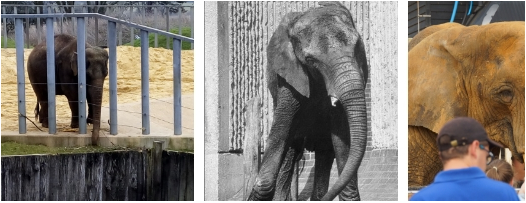
Call To End Captive Misery For Elephants In UK Zoos
International wildlife charity Born Free has today called for a phase out of elephants from UK zoos, in light of continued concerns about elephant welfare and shortened lifespan.
The charity- which was originally founded as Zoo Check in 1984 after the death at London Zoo of a wild-caught African elephant named Pole Pole - is concerned that the needs of elephants cannot be met in a zoo environment. And it seems that the UK public also has concerns with a new survey, carried out by Ipsos Mori on behalf of Born Free, indicating that more than half (56%) of those polled think that elephants should not be kept in zoos in the UK.
In 1984, there were 20 zoos in the UK keeping around 50 elephants, of which 44 had been taken from the wild. Today, 35 years later, there are 52 elephants in 12 zoos across the UK. Now, Born Free is calling for there to be no elephants in UK zoos within the next 35 years.
Elephants in captivity risk dying younger than their wild counterparts: for example, for those African elephants present in the UK in 1984 who have since died, more than half did not reach 20 years old. In protected areas in the wild, at least half of African elephants might be expected to live to 56 years old or more.
In addition to reduced life expectancy, elephants face a range of problems from life in zoos including:
- Elephant endotheliotropic herpesvirus (EEHV), the biggest killer of young elephants in captivity.
- Abnormal behaviour, such as repetitive stereotypic swaying or pacing which is still seen in UK zoos.
- Restricted space in relatively tiny enclosures lacking complexity, resulting in reduced activity and subsequent obesity and foot and joint problems.
- The cold climate of the UK compared to elephants’ natural habitat in Africa and Asia.
- Unnatural groupings of small numbers of unrelated elephants, and in some cases elephants kept alone, isolated from contact with members of their species.
- Frequent transfers of individual elephants between zoos and separation from social groups, despite a need for stable life in family herds.
Take the example of elephants such as Thi Ha Way: Born in the wild in 1982, Thi Ha Way currently lives at Chester Zoo. She has birthed nine calves, only two of which are still alive. She reportedly killed her first calf shortly after birth; her second calf only survived a year; her third calf collapsed and died at 21 years old; her forth calf is 18 years old but was sent to a zoo in Hungary; her fifth calf was stillborn in 2004; her sixth, seventh and eighth calves (born 2006, 2011, 2015) all died of EEHV aged between two and three; her ninth calf was born in 2018 and is currently alive.
As if the plight of a zoo elephant were not sad enough, some UK zoos continue to permit their keepers to handle elephants using an ankus, or bullhook. This hook-ended tool is often referred to as a “guide”, but is used to tap, pull or even hit elephants to control their movements. In order for this implement to be effective, elephants will be aware of its ability to cause pain. Born Free’s survey also found that more than three quarters (78%) of people polled, after being shown a photo of some examples of bullhooks, believed that the use of this implement is unacceptable.
“The current protection we afford to these intelligent and sensitive animals is wholly insufficient. Life for elephants in zoos is unnatural in almost every way. An honest assessment of zoos in the UK would conclude that they are no place for elephants,” said Dr Chris Draper, Born Free’s Head of Animal Welfare & Captivity. “Life in the wild is increasingly tough for elephants, certainly, but life for elephants in zoos is neither a genuine alternative to life in the wild nor free of significant hardships. If, as has been claimed, zoos consume rather than produce elephants, the UK should have no part in continuing to subject such magnificent and complex animals to the restrictions of zoo life.”
Born Free aims to phase-out the keeping of elephants in UK zoos over time. In order to make this a reality, the charity is calling, as a priority, for an end to the import of elephants to the UK and a moratorium on the breeding of elephants in zoos. Anyone wanting to help can write to Defra Ministers and ask them to take action to phase out elephants from UK zoos. A pre-drafted letter directly to Defra can be accessed from the Born Free website: www.bornfree.org.uk/elephant-take-action.
Technical notes
Research was carried out by Ipsos MORI on behalf of Born Free. It surveyed a nationally representative quota sample of 1,112 adults in the United Kingdom aged 16-75 using its online I:Omnibus between 1st and 5th February 2019. Data has been weighted to the known offline population proportions for age within gender, government office region, working status and social grade. The figure reporting the number of respondents who think elephants should not be kept in zoos (56%) is a combination of the answers “Definitely should not” and “Probably should not”, while that reporting those who find unacceptable the use of bullhooks (78%), combine “Fairly unacceptable” and “Completely unacceptable”.
Elephant Case Studies highlight transfer and birth rate:
London Zoo elephants:
Azizah (Layang Layang): Wild caught 1985 and sent to London Zoo. 2001 moved to Whipsnade. She produced four male calves (Toomai died aged 13 in a Spanish zoo, Donaldson died aged one (Herpes virus), seven-year-old Scott was sent to a zoo in Poland, four year old Sam is still at Whipsnade awaiting decision for his future home). Azizah was euthanised following ill health in 2018 aged 34.
Geeta (Dilberta): Wild caught 1982 and sent to London Zoo. 2001 moved to Whipsnade. She never produced any calves. She was euthanised due to severe arthritis in 2006 aged 26.
Mya: Wild caught 1989 and sent to London Zoo. 2001 moved to Whipsnade. She has yet to produce any calves. Moved to Naples zoo, Italy in 2018 due to her reportedly not getting on with the rest of the herd (following death of Azizah). She is aged 37.
Other zoo elephants:
Jangolie is a 51-year-old female Asian elephant. She was captured from the wild (Myanmar) in 1971 at around 3 years old and sent to Flamingo Land themepark in Malton, UK. She was there for 23 years before being moved to Chester Zoo in 1994. She stayed at Chester for 20 years, during which time she produced three calves. One still born calf in 1998; a male calf in 2000 (now at a zoo in Belgium); and another male calf in 2004, which died in 2017 at a zoo/themepark in Belgium (aged 13). In 2014 Jangolie was transferred to Madrid Zoo, Spain, where she stayed for just one year before being moved to Selwo Aventura Zoo, Spain in 2015, where she now lives with a 54-year-old captive-born female elephant.
Thi Ha Way is a 37-year-old Asian female elephant. She was captured from the wild (Myanmar) in 1982 and sent to Emmen Zoo, Netherlands in 1988, before being moved to Longleat Safari Park for a brief time. End of 1988 she was moved to London Zoo, where she spent three years before being moved to Chester Zoo, where she currently lives. At Chester Thi Ha Way has produced nine calves, only two of which are still alive. She killed her first calf in 1993 shortly after birth; her second calf only survived a year; her third calf collapsed and died at 21 years old; her forth calf is 18 years old and alive at Budapest Zoo, Hungary; her fifth calf was stillborn in 2004; her sixth, seventh and eighth calves (born 2006, 2011, 2015) all died of herpes virus aged just two and three; her ninth calf was born in 2018 and is currently still alive.
Tana (Tots) is a 32 year old African elephant. She was captured from the wild (Zimbabwe) in 1990 at around 3 years old and sent to Windsor Safari Park. She stayed at Windsor for nearly three years before being moved to Knowsley Safari Park in 1993. At Knowsley she produced two calves, a female born in 2003 that died aged 14 years (reportedly during transport) and a stillborn calf in 2007. Tana was moved to Zoo Parc de Beauval, France in 2017 to join their small herd.
Kirsty is 52-year-old Asian elephant. She was captured from the wild in 1971 and sent to Glasgow Zoo, where she spent 15 years before being transferred to Chester Zoo in 1987. In 1994, she was moved to Dublin zoo. In 2005 she was moved to Zoo Neunkirchen, Germany where she lives today. She has produced no offspring and reportedly Dublin zoo wanted to bring in some younger female elephants for breeding purposes.
Tanya is a 38-year-old African elephant. She was captured from the wild (South Africa) in 1983 and sent to Longleat Safari park. In 1985 she was moved to Colchester zoo, where she lives today. She produced a male calf at Colchester in 2002 (via artificial insemination), which died in 2017 aged 15, at Dvur Kralove Zoo, Czech Rep, reportedly from heart disease.
Zola is a 37-year-old African elephant. She was captured from the wild in 1983 and sent to Longleat Safari Park in 1984. Moved to Colchester zoo in 1985, where she lives today. She gave birth to stillborn calves in 2003, 2005, 2008 and 2011.
Lucha is a 37-year-old Asian elephant. She was captured from the wild in 1989 and sent to Whipsnade Zoo, where she has lived for the last 30 years. In this time, she has given birth to one stillborn calf in 2002.
Kaylee is a 37-year-old Asian elephant. She was captured from the wild in 1989 and sent to Whipsnade Zoo, where she has lived for the last 30 years. In this time she has produced three calves. One in 2004 (died in 2006 Herpes virus), one in 2007 (died in 2009 Herpes virus), one born in 2009 (still alive).

About Us
About Born Free
Born Free’s mission is to ensure that all wild animals, whether living in captivity or in the wild, are treated with compassion and respect and are able to live their lives according to their needs. Born Free opposes the exploitation of wild animals in captivity and campaigns to keep wildlife in the wild.
Born Free promotes Compassionate Conservation to enhance the survival of threatened species in the wild and protect natural habitats while respecting the needs of and safeguarding the welfare of individual animals. Born Free seeks to have a positive impact on animals in the wild and protect their ecosystems in perpetuity, for their own intrinsic value and for the critical roles they play within the natural world. For more information about Born Free please visit: www.bornfree.org.uk
Contacts
Links